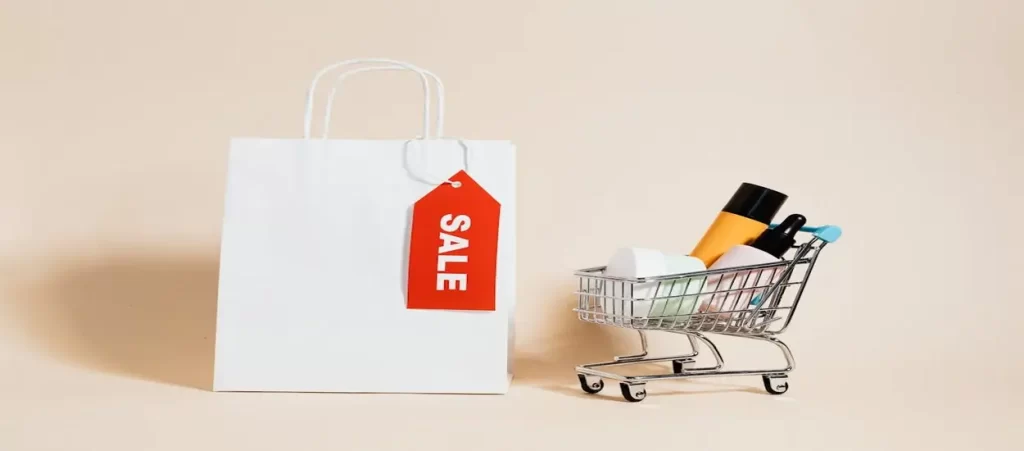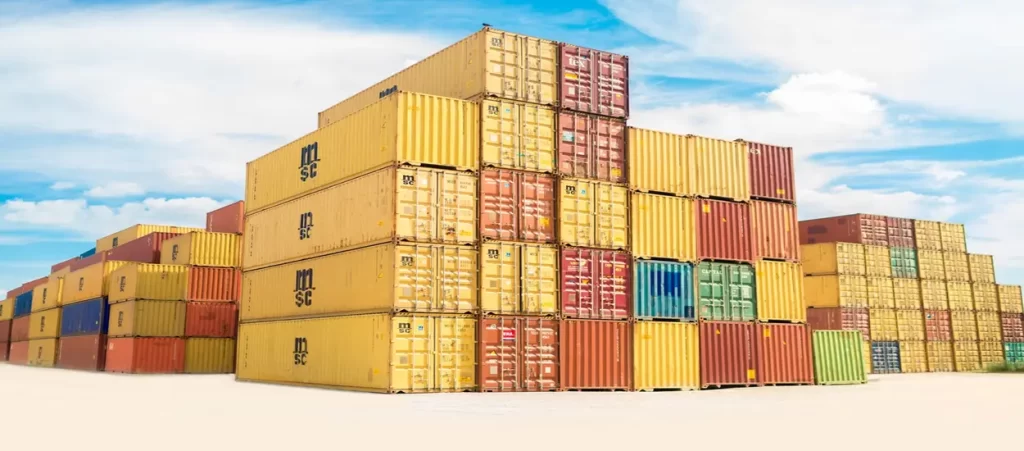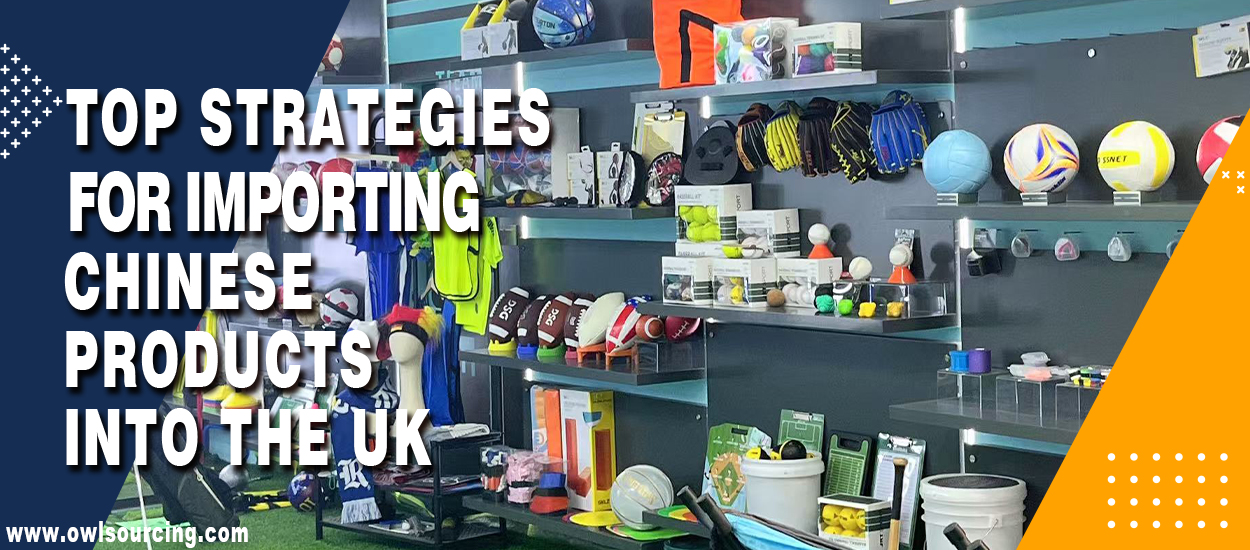You may know that China is the main exporter of many products. The nation has grown a reputation for being innovative and affordable.
If you want to start a business, China offers incredible perks, such as cost savings. So, how do you import from China as a UK business? What steps do you take to get the product home?
Importing products from China can be challenging for a newcomer. But once you know the steps, it is a smooth sail. Fortunately, I am here to help with everything I know about China sourcing.
If you’re searching for the best sourcing service from China to the UK, you’re in the right place. This China-UK trade process guide covers how to import from China to the UK. Keep reading to understand the entire sourcing process from top to bottom.
What Profitable Products Can You Import from China to the UK?

| Product Category | HS Code | Duty Rate (%) | Learn Here |
| Electronics | 8542 | 0–5% | Import Electronics from China |
| Textiles | 6204 | 12% | Importing Clothing and Textiles from China |
| Toys and Games | 9503 | 0–4.7% | How to Import Toys From China? |
Electronics are the absolute best seller with imports. This option is one of the most profitable choices you can make as a first-timer, unsure of the market.
First, China is at the forefront of quality and affordable electronics. Moreover, the UK market has a massive customer base for Chinese electronics. It means electronics are in the sweet spot. You can read the top Guangzhou electronics wholesale market guide for more insights.
Another profitable option is clothing. Chinese manufacturers are creative and innovative in their designs. It makes Chinese clothing a sought-after product among UK players.
The demand for clothing is high, so you get a booming market when you decide to import. You get different varieties from Chinese suppliers. Check out – how to import baby clothing from China? and importing bamboo textiles from China.
Aside from the two popular options, there are several other profitable options. They include machinery, equipment, chemicals, and automotive.
Above all, we recommend adequate market research to ensure your product will sell. Check out the top products imported from China to the UK. Don’t just go for the widely acclaimed, profitable goods. Ensure you know if it is what your potential market wants first. Research by referring to trendy products in your region.
What Licenses Do You Need to Import from China to the UK?
It depends on the imported goods. Products such as food, drugs, and chemicals often require a license to cross the border. However, consumer goods and clothes usually don’t.
| License/Certification | Description |
| EORI Number | Essential for customs clearance. It’s a unique identifier assigned to businesses involved in import and export activities. |
| Product-Specific Licenses | The following products may need specific licenses from relevant UK authorities.
|
The Leading China Sourcing Agent for Sourcing and Manufacturing in the UK
Owlsourcing is the top China sourcing agent providing sourcing and manufacturing solutions that are specifically designed for UK businesses.
With extensive knowledge in traversing China’s intricate supply chain, we assist UK businesses in effectively sourcing quality products, handling custom manufacturing projects, and adhering to UK market requirements.
From increasing production to having reliable factories, Owlsourcing provides full-cycle support with transparency and accuracy. Meet with us today and let us plan how we can make your sourcing from China to the UK easier.
Simple Steps to Import Goods from China to the UK

China product sourcing process can be challenging. Check the steps below to understand the sourcing process.
Step 1: Get an EORI Number
An EORI number is necessary for customs declarations in the UK. You can apply for your EORI number using the UK government’s website.
Also, ensure the number starts with “GB” for UK customs processing. It is an important first step to providing a seamless importing experience.
Step 2: Pick Out the Right Product

Deciding which products you want is important. That’s because it determines your business’s potential. Importing less trendy or successful items can lead to losses. Instead, do in-depth market research to find the products that would make a lot of profit.
Step 3: Find A Reliable Chinese Supplier
Finding suppliers in China for the UK market can be demanding. However, it is crucial for a seamless experience. Use platforms like Alibaba and Made-in-China. They provide several viable options.
You can also opt to attend trade fairs in China. Check the top Chinese trade shows below.
| Trade Fair Name | Location | Frequency | Key Industries |
| Canton Fair | Guangzhou | Twice a year | General goods, electronics |
| Yiwu International Fair | Yiwu | Annually | Small commodities, textiles |
| China Electronics Fair | Shenzhen | Multiple times a year | Consumer electronics, gadgets |
| East China Fair | Shanghai | Annually | Textiles, fashion, home products |
Step 4: Supplier Verification
| Verification Criteria | How to Verify | Red Flags |
| Business License | Request official business documents | Missing or unverifiable licenses |
| Product Certifications | Ask for certificates (e.g., RoHS) | Lack of mandatory certifications |
| Trade References | Contact previous buyers | Poor reviews or no references |
| Factory Visit Option | Consider third-party inspection services | Refusal for inspections |
It would help if you verified the Chinese supplier’s legitimacy thoroughly. It includes reading reviews and conducting background checks.
You also want to ensure the products meet the desired quality. It includes requesting samples and hiring inspection agencies to inspect them. Product quality in China is essential and should be handled with care.
Step 5: Understand Import Restrictions
Verify that the goods you intend to import are permissible under UK law. Some items need special licenses or permits.
The UK government provides comprehensive guidance on restricted goods and necessary certifications. Contact the UK Border Force for more insight on navigating this hurdle.
Step 6: Classify Your Goods

Use the UK Trade Tariff tool to determine your product’s commodity codes. These codes are necessary for determining import duties and VAT rates. The right classification is critical to prevent delays. It also ensures compliance with customs regulations.
Step 7: Duties and VAT
Figure out the customs duties and VAT applicable to your goods. Use the UK Trade Tariff to find the specific rates. VAT is generally charged at 20% of the total goods’ value, including shipping costs.
Step 8: Arrange Shipping
Choose the right partner for shipping from China to the UK that suits your budget and delivery time.
You can choose an air freight service from China. This option is fast but expensive. However, it is ideal for high-value or time-sensitive goods. The other route is sea shipping from China. This option is cost-effective, slow, and suitable for bulk orders.
Arrange with the supplier to ensure logistics and shipping arrangements are handled. Efficient logistics for China-UK imports need all hands on deck.
Step 9: Handle Customs Declarations
Customs declarations can be complex. It involves detailed paperwork and adherence to regulations. You can manage this yourself or get a customs agent. They can handle the documentation, ensure compliance, and expedite the clearance process.
Step 10: Pay Duties and VAT
Customs duties and VAT are crucial for UK-China imports. The price for duties and VAT often varies with the product you are importing.
The fees should be paid on time to release your goods from customs. If the cost is available on standby, it prevents any form of delay.
Step 11: Clear Customs
Duties and VAT must be paid. It is the only way your goods can enter the UK. You also need to maintain communication with your customs agent. The step ensures that you don’t import any prohibited goods.
What are the Prohibited and Restricted Products from China to the UK?

You can’t buy anything from China and send it to the UK. As an importer, knowing blocked items ensures you have limited issues with customs. Here is a brief list of those items to avoid when product sourcing:
| Restricted/Prohibited Item | Reason | Permit Required? | Governing Authority |
| Certain Agricultural Products | Biosecurity concerns | Yes | DEFRA |
| Weapons and Firearms | Public safety | Yes | UK Home Office |
| Counterfeit Goods | Intellectual property laws | No | UK Border Force |
| Hazardous Chemicals | Environmental safety | Yes | HSE (Health and Safety Executive) |
It is crucial to understand that prohibition and restriction are two different concepts. Prohibition means that you can’t import goods from China to the UK. However, the restriction means that the goods need special permission before being imported.
We recommend you consult a custom professional. You can also visit the UK Border Agency website or call the UK Border Force. Dealing with prohibited and restricted products without permission can harm your business. UK import regulations for China trade are essential.
Note: You can import anything from consumer goods to heavy-use machinery. However, there are also some products you can’t import. You should refer to the UK customs website to know what you can’t import. Once that’s clear, you know where the lines are when importing.
Key Documents Needed for Importing Goods from China to the UK
| Document Name | Purpose | Who Needs It | Who Offers It |
| Bill of Lading | Proof of shipment | Importer | Shipping company |
| Commercial Invoice | Declares the value of goods for customs | Customs/Importer | Exporter |
| Packing List | Detailed list of items in the shipment | Importer | Exporter |
| Certificate of Origin | Verifies the goods’ country of manufacture | Customs | Exporter/Chamber of Commerce |
Additional Tips to Ensure Successful Importing from China to the UK

Successful importing is possible once you follow the required steps. However, some tips can ensure a seamless experience. Once you know the tips, it gets easier. This section covers everything you should know to ensure that it happens.
1) Hire A Sourcing Agency
Sourcing agencies make importing a lot easier. It frees your time to handle other parts of your business. OwlSourcing takes over the wheel from product sourcing to shipping the goods. Moreover, we do this at a competitive rate. Contact us to get started. Save yourself from the risks and stress of handling the process yourself.
| Aspect | What OwlSourcing Offers | How It Helps You |
| Supplier Verification | Thorough vetting of suppliers | Minimises the risk of scams |
| Price Negotiation | Uses industry expertise for better deals | Saves you money on procurement |
| Quality Control in China | Inspection of goods before shipment | Ensures products meet your standards |
| Shipping & Logistics | Coordination of freight and customs clearance | Reduces delays and simplifies imports |
| Post-Purchase Support | Assistance with reorders and resolving issues | Builds long-term supplier relationships |
2) Insure Your Goods
Insurance can guard against damage to your goods while they are in transit, but that’s only a piece of the overall risk. In China, the quality of your order is often unreliable, and suppliers can take shortcuts or even engage in scams. Without proper Quality Control (QC) at the factory, you may be stuck with defective, non-conforming, or substandard products, all of which your insurance cannot fix.
QC guarantees your products are produced to specification before they ship, reassuring you of consistent and reliable production, and protecting your investment. The bottom line is you simply cannot afford to have QC in China as an option. It is a requirement.
3) Maintain Good Communication
You must communicate with suppliers. This way, you ensure all the details are accurate. Moreover, you need your goods to meet the required UK standards.
How OwlSourcing Handled the Challenges of China-UK Trade

I would like to share our collaboration with a UK-based e-commerce client. Their company specialises in home decor. However, they were struggling to source high-quality ceramic vases from China.
OwlSourcing helped them streamline the whole supply chain. We identified reliable China suppliers, negotiated favourable terms, and ensured strict quality control. Our team also prepared all necessary documentation for smooth customs clearance.
As a result, we successfully delivered the ceramic vases to our client’s UK warehouse. This collaboration enabled them to expand their product range.
Sourcing products from China for the UK is not limited to Alibaba. Many suppliers seem legitimate, but are non-expert trading companies or unreliable factories. OwlSourcing makes sourcing from China easy and safe.
Why choose OwlSourcing?
✅ Directly sourced from factory-audited manufacturers, no middleman.
✅ We check suppliers, manage samples, oversee spot inspections on your behalf, and manage shipping.
✅ Not only is it transparent pricing, but you are also given options to fully customise.
✅ We find products for you and support you through the entire journey from sourcing to delivery.Based in Shanghai, and with years of practical experience sourcing and importing goods from China, our company helps UK importers avoid expensive mistakes, reduce time and complexity in the sourcing process.
👉 Do you want to work with your ideal China manufacturer? Contact OwlSourcing today.
Read More:
- Permits and Licenses When Importing from Asia
- China Sourcing Companies for Custom Products
- How to Source Products From China?
- How to Wholesale a Custom Product in China
Final Thoughts!
Following the steps in this guide makes importing products from China to the UK seamless. The operation becomes much easier and streamlined. Moreover, over time, you get the rhythm of how things work.
Also, ensure you stay informed about potential changes. These changes can change how you handle the product sourcing process in China. However, if the process gets overwhelming, reach out to us. We provide affordable China sourcing services. Please sit back and let us work our magic.
Sources:


